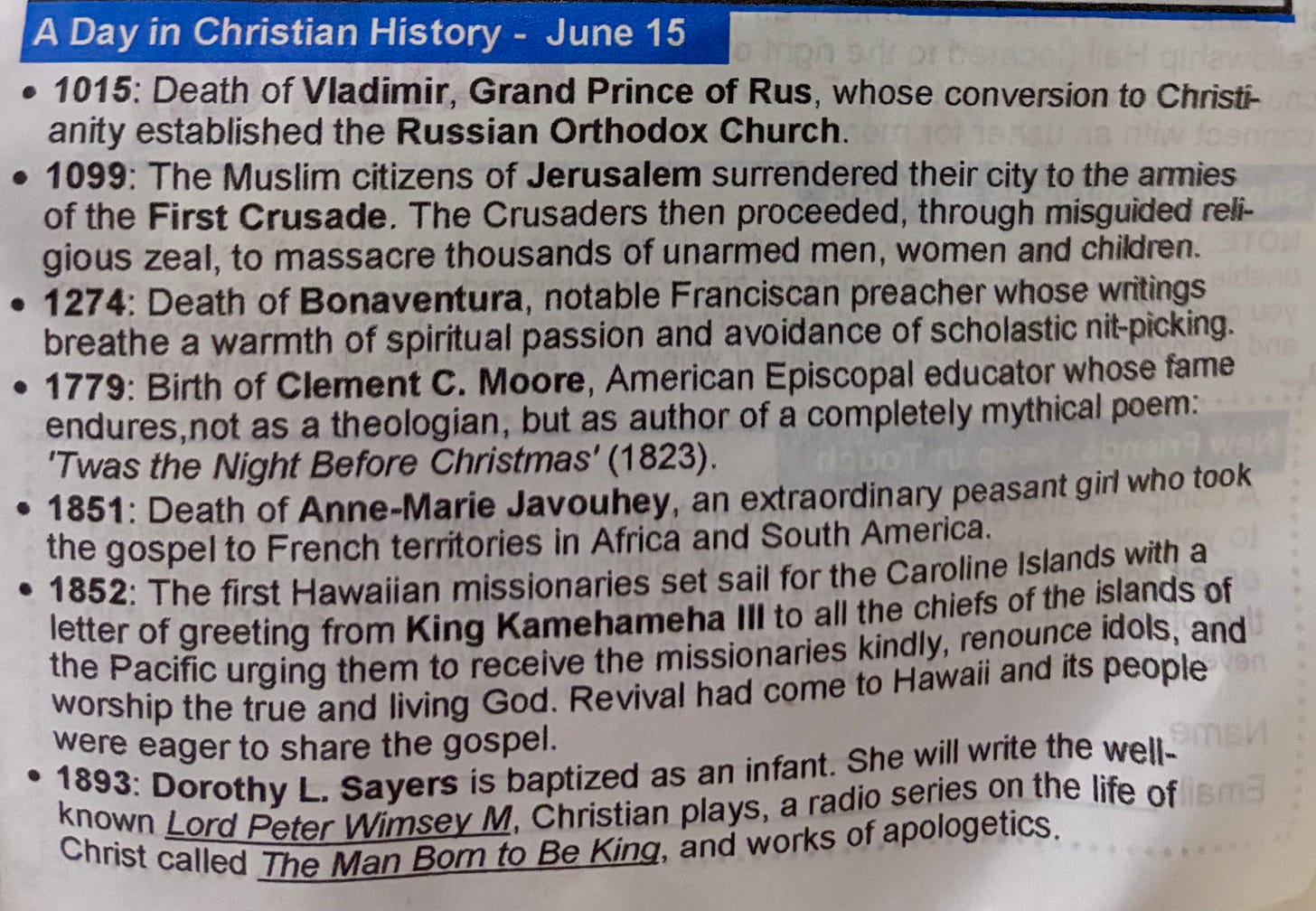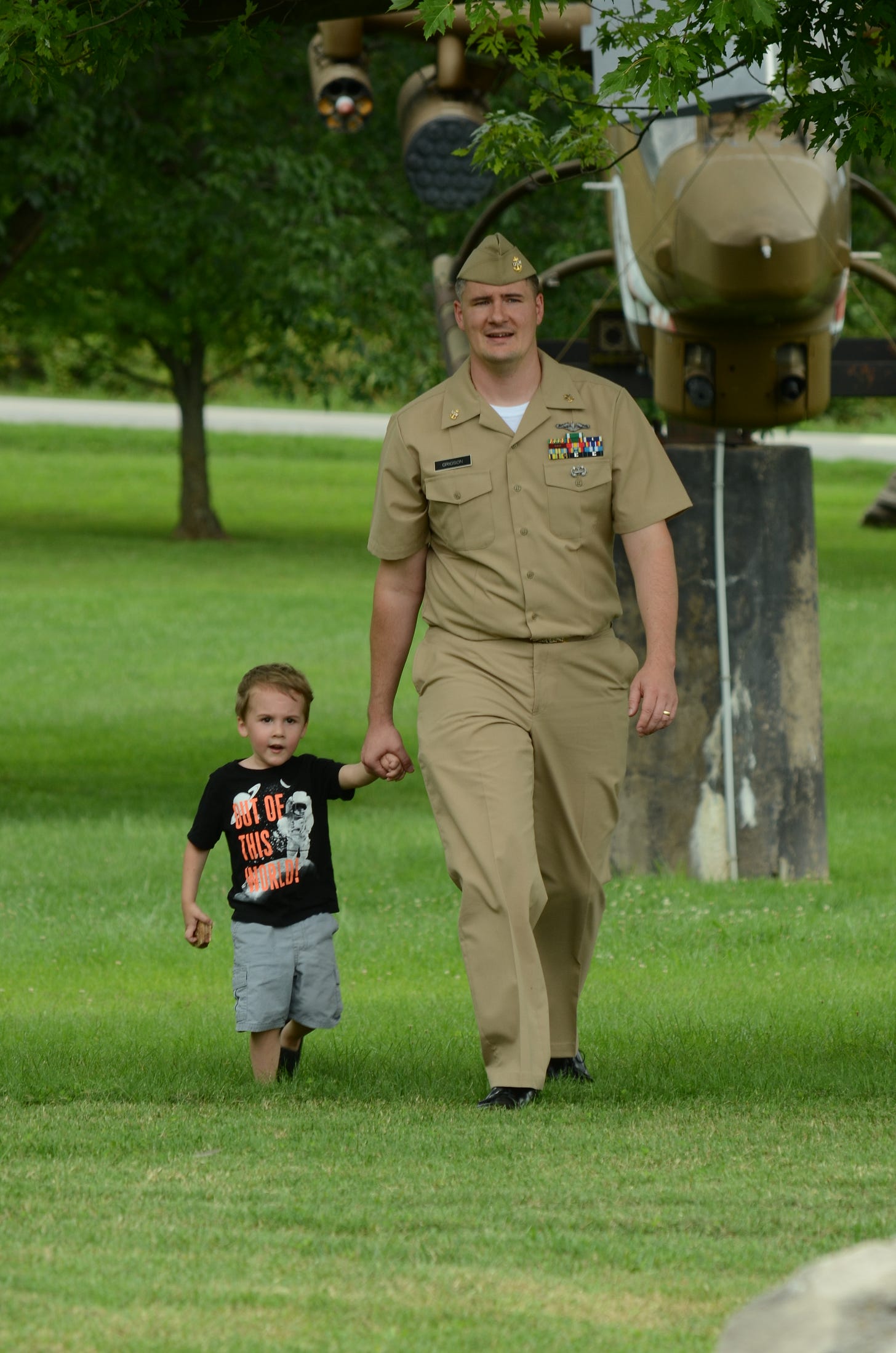Heritage or History?
These commandments that I give you today are to be on your hearts. Deut 6:6
Of Seaglass
When I was a child, I remember my grandfather having an incredible collection of seaglass. I recall being mesmerized as a young child by the jar of white, brown, yellow, blue, and especially by the green shards of glass. I was not only transfixed by the soft, multi-colored kaleidoscope, but I was also amazed by the fact that what was once a razor-sharp shard of glass waiting to cut me was subdued by water and the shore. How could something so dangerous become so safe? The boundary between the ocean and shore is a transformative place. During our time in RI, my kids have found many interesting things on the beach, including seaglass. The memory was a timely one since I recalled it on Father's Day.
Collecting seaglass (or most things) brings out several inherently virtuous character traits. Patience, attention to detail, thrill of discovery, curiosity about what is under the next rock, determination, and, in this case of seaglass, for me, a sense of heritage.
Of History
Professional Naval Chaplaincy
Part of my training last week included 158 slides of Professional Navy Chaplaincy History. It was filled to the brim and then some of names, dates, and "firsts." The training started in Deuteronomy 20:1-4. Then, onto the origin of the word "Chaplain" and "Chapel," St. Martin of Tours, a Roman soldier turned priest in the 4th century. Chaplaincy in the United States Navy arose from an interesting combination of Royal Navy Tradition and religious/political trends surrounding the War for Independence. Don't worry, I will spare you the 158 slides full of bullet points with names and dates - for now.
However, here is a picture of me in front of the historic Brett Hall. I won't recount Chaplain Brett’s story here. It is a quick Google search away. I will say, however, that I am honored to pass through these hallowed halls. Many Chaplains were introduced to the Navy through this schoolhouse. Chaplain Robert Brett's self-sacrificial example of ministering on the battlefield inspires me to prioritize myself last. The flock that God has given me comes first. This starts at home. I work hard for my wife and kids, then give everything I have to all around me (I generally pastor everyone in sight...).
Church History
I have jokingly quoted the great Ron Swanson, a character on the TV show Parks and Rec, that "History began in 1776. Everything before that was a mistake." Americans have been understandably accused of having historical amnesia. In fact, when I traveled to Norway in 2009, I discovered a house on the wharf that had continuous occupancy for 900 years! They have domiciles that predate the 13 colonies! Pentecostals sometimes have the same problem. We believe that all of Church History before Azusa Street was a mistake. We have Church History amnesia.
My wife, kids, and I attended North Kingstown Assembly of God for Father's Day. What a delightfully warm church in rural Rhode Island! My kids felt comfortable in a new environment to go to their children’s church and make me a Father's Day craft. It was a very sweet time of worship. They are hungry and praying and seeking God's living presence!
Something that I have not seen before in most of the churches I have been in is an emphasis on Church History. Here, I was pleasantly surprised to find in their bulletin a section for Church History! In some ways, I was primed and ready for this from last week's training. And although I enjoy and have learned much church history, some of the dates in the bulletin were unknown and therefore did not carry any meaning for me.
Most of the above is history, some of it was heritage. What is the difference?
Biblical Concept of Heritage
If you are like me, when you hear the word "heritage," Psalm 127 comes to mind:
Psalm 127
A song of ascents. Of Solomon.1 Unless the Lord builds the house, the builders labor in vain.Unless the Lord watches over the city, the guards stand watch in vain.2 In vain you rise early and stay up late,toiling for food to eat— for he grants sleep to[a ] those he loves.3 Children are a heritage from the Lord, offspring a reward from him.4 Like arrows in the hands of a warrior are children born in one’s youth.5 Blessed is the man whose quiver is full of them.They will not be put to shame when they contend with their opponents in court."Children are a heritage from the Lord." What does that mean? The word itself comes from Middle English out of the French influence that was so prevalent during that time. It comes from the same family of words as hereditary, heir, and inherit. In general, it means something that you possess simply by being born. In other words, when you are married and do the things that married people do (figure it out, kids), children naturally follow from that simply by the nature of being "born" into a marriage. Theologically, since God is the creator and set our world up like that, then where do children come from? From God! He is the one who gives them to you.
And by extension, for those beset by infertility, also from the creator God. In other words, it isn't your fault. You are not broken. It isn't a lack of faith or a deficiency of character. Nor is God arbitrary. He has reasons and purposes that are for us to live and discover. None of that has to do with our topic today - that was extra.
The point here is that children are given by God.
Keepers of Heritage
So why do we use the word "heritage" when we are talking about our history? If it was said once, it was said 1,000 times during the Naval Chaplaincy History brief.
My Navy birthday is 29 June. This year, it will officially be 20 years from the day that I shipped to RTC (Recruit Training Command - Boot Camp) in Great Lakes. Around 2016, I was selected for the rank of Chief Petty Officer. Chiefs are an important component of the Navy. We consider ourselves keepers of the Navy's heritage. Every year during a Chief's (or Senior Chief's, or Master Chief's) annual evaluation, one of the seven categories that we are graded on is "Sense of Heritage." It is literally part of the criteria that makes a great Chief a great Chief.
I only bring this up to point out the fact that I have deeply considered what heritage is since 2016. Not only have I considered what heritage is for myself, but I have trained many new Chiefs (some of them the hard way) to understand heritage as intuitively as possible. But an intuitive understanding isn't easy to teach. So I have had to think about it abstractly also.
Of Heritage
Let's tie it all together.
Recall above that I said I wouldn't recount Chaplain Brett's story because you could Google it. Here is the litmus test about the difference between history and heritage: If you can Google it, it's history. If it comes from within, it's heritage.
Chaplain Brett's story is part of my timeline. He came before me as a professional Naval Chaplain. I was not present for any of the events in Vietnam when Chaplain Brett performed his pastoral duties with gallantry. But because I am a Navy Chaplain and he was a Navy Chaplain, I inherited his story. It is mine by "birthright."
Chaplain Brett's story is my history. The inspiration to live self-sacrifically is my heritage.
If history is important, you must know it, internalize it, and allow it to live and bubble up in your heart as your heritage. Otherwise, it is just history. To be fair, I don't connect or try to connect with every historical event in my timeline. There is simply too much. Sometimes it is good to accept a general connection to your timeline. So even if I haven't processed a story into my heart, I still maintain a general internal affection for all Navy History, Chief History, and now Chaplain History.
There is one last component missing from a full understanding of heritage.
Communicated for Action
The full Craig Grigson III definition: Heritage is history filtered through your heart and communicated for action.
We have already discussed history and heart, communicating it for action is the last part. If you have been inspired to embody a particular character trait, or live a certain way, or whatever, then excellent! Now, it is time to look for the opportunity to communicate this to others to receive the same benefit. This is true of all knowledge, I suppose. What good does it do if it lives within you and never helps anyone else out? This seems like the servant who was given the one talent and buried it in the backyard. It was given to you for a reason. Look for ways to use it in the lives of others.
I have had several stories in my timeline inspire me, but I haven't always had a chance to use them. That's ok. It doesn't always fit the situation. Just be on the lookout and use the story when the opportunity arrives.
Church Heritage
So, regarding Church history, there are stories in the past that feed our spiritual lives in astounding ways. Missionary stories, Roman chaplain stories, and early church martyrs all fuel the living, burning flame in my heart. This history is mine by birthright, and I must take possession of it and use it – not just for my benefit but for the benefit of others.
Be a good keeper of the Church's heritage. Own it. Live it and be inspired by it. Then be ready to give it to those who need it.
He proclaimed the kingdom of God and taught about the Lord Jesus Christ—with all boldness and without hindrance! Acts 28:31 NIV
Acts 28:31 is the last verse in the book of Acts. The interesting thing is that Luke, who did such a great job of reading and writing down the history of Jesus and the Church, ended Acts very abruptly. It doesn't resolve the conflict. We don't read the end of the story. What happened? Did Paul die? Did Luke die?
I think that there is a divine reason for this. The only church history book in the New Testament is Acts, and it doesn't end. Your timeline goes all the way back to the beginning in a straight line from you to Jesus, passed on from generation to generation. Your church heritage, going all the way back to Jesus, is your birthright. It is given to you by God.
I humbly invite you to ponder that for a while.
Biblical Heritage
The Bible is God's self-revelation. It is more about Him than us. Furthermore, because it is divinely inspired and comes from God's very heart to yours – from before the very beginning of creation (Proverbs 8, John 1). God's word is given to you as your birthright (presuming you are "born from above", John 3).
Read it. Love it. Internalize it. And communicate it for action.
6 These commandments that I give you today are to be on your hearts. 7 Impress them on your children. Talk about them when you sit at home and when you walk along the road, when you lie down and when you get up. 8 Tie them as symbols on your hands and bind them on your foreheads. Deut 6:6-8 NIV
I realize that the above is talking about passing it on to your children, but don't overlook the opportunity to become spiritually responsible for someone around you. Like Paul did for Titus or Timothy.
The difference between biblical knowledge and biblical life is like the difference between history and heritage. Is it just facts and stories, and references to chapter and verse? Or is it alive in your heart and communicated for action?
Children are a heritage from the Lord, offspring a reward from him. Psalm 127:3 NIV
Circling back to children (biological, adoptive, or spiritual). Children are a heritage from the Lord. They are given to you as a birthright of being married or spiritually alive enough to care about someone enough to spiritually parent them. But this is a weird thing because they come after you in your timeline. Your parents come before you, and your family history is your heritage, but you precede your children. I realize I am making a logical and linguistic category leap, but I think there is room for this, particularly in my definition of heritage, having past, present, and future components (history filtered through your heart and communicated for action).
Let me Pray for You
Lord, I thank you for your word. I thank you for your gracious gift of my timeline. I pray that you would give all who read here a perspective of their own history that is alive in their heart and mind. More than that, Lord, I pray that you would give each one here an opportunity to communicate their love for you to others. God, we desire to be used by you. Fill us with your Word and Holy Spirit. In Jesus’ name, amen.








